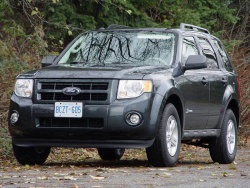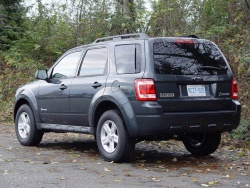  2009 Ford Escape Hybrid . Click image to enlarge |
|
Related articles on Autos
Manufacturer’s web site
|
Review and photos by Greg Wilson
Find this vehicle in Autos’s Classified Ads
Photo Gallery:
2009 Ford Escape Hybrid
North Vancouver, British Columbia – It may be one of Ford’s most fuel-efficient vehicles, but changes to the Ford Escape Hybrid for 2009 have more to do with performance and driveability than fuel economy. A bigger 2.5-litre four-cylinder engine, which replaces last year’s 2.3-litre unit, adds more horsepower and torque; a new braking system and pedal sensor improves brake pedal feel; and an improved engine processor provides smoother transition from gas to electric mode.
Fuel economy remains about the same – which is to say, excellent for a compact SUV. For the front-wheel drive model, Energuide fuel economy figures (L/100 km) are 5.8/6.4 City/Hwy (compared with 5.7/6.7 City/Hwy in 2008). Escape Hybrid 4WD figures are 7.0/7.4 City/Hwy (compared to 6.8/7.3 City/Hwy last year).
To put this in perspective, compared to the regular four-cylinder Escape XLT 4WD (automatic) model, the 2009 Escape Hybrid 4WD model provides about 35 per cent better fuel economy in the city and seven per cent better on the highway. Its thrifty city fuel economy is due to its “full hybrid” system that allows it to run on battery power alone at low speeds. As well, its “auto stop” feature automatically turns off the gas engine while stopped at traffic lights.
The new 2.5-litre engine features a couple of technological features designed to improve fuel economy: variable valve timing which provides more torque over a wider rev range, and Atkinson Cycle operation where the intake valve is kept open longer than normal to improve efficiency and fuel economy at the expense of power. Electric drive power makes up for any horsepower loss.











